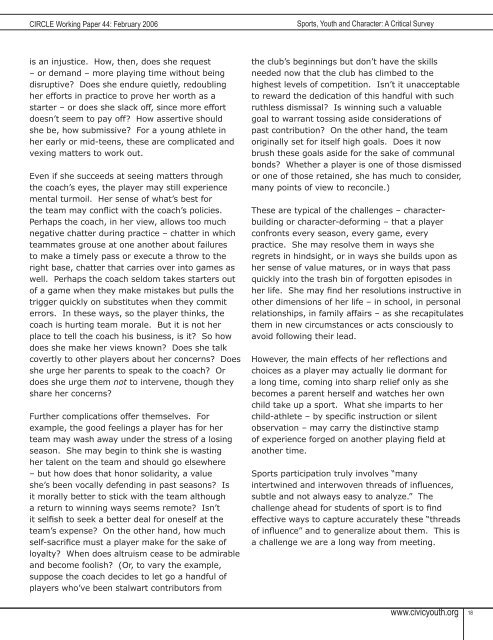The All-Sports Ministry of PA NJ & DE - Executive Summary Start-Up Budget & Prospectus
The All-Sports Ministry of PA NJ & DE - Executive Summary Start-Up Budget & Prospectus
The All-Sports Ministry of PA NJ & DE - Executive Summary Start-Up Budget & Prospectus
Create successful ePaper yourself
Turn your PDF publications into a flip-book with our unique Google optimized e-Paper software.
CIRCLE Working Paper 44: February 2006<br />
<strong>Sports</strong>, Youth and Character: A Critical Survey<br />
is an injustice. How, then, does she request<br />
– or demand – more playing time without being<br />
disruptive? Does she endure quietly, redoubling<br />
her efforts in practice to prove her worth as a<br />
starter – or does she slack <strong>of</strong>f, since more effort<br />
doesn’t seem to pay <strong>of</strong>f? How assertive should<br />
she be, how submissive? For a young athlete in<br />
her early or mid-teens, these are complicated and<br />
vexing matters to work out.<br />
Even if she succeeds at seeing matters through<br />
the coach’s eyes, the player may still experience<br />
mental turmoil. Her sense <strong>of</strong> what’s best for<br />
the team may conflict with the coach’s policies.<br />
Perhaps the coach, in her view, allows too much<br />
negative chatter during practice – chatter in which<br />
teammates grouse at one another about failures<br />
to make a timely pass or execute a throw to the<br />
right base, chatter that carries over into games as<br />
well. Perhaps the coach seldom takes starters out<br />
<strong>of</strong> a game when they make mistakes but pulls the<br />
trigger quickly on substitutes when they commit<br />
errors. In these ways, so the player thinks, the<br />
coach is hurting team morale. But it is not her<br />
place to tell the coach his business, is it? So how<br />
does she make her views known? Does she talk<br />
covertly to other players about her concerns? Does<br />
she urge her parents to speak to the coach? Or<br />
does she urge them not to intervene, though they<br />
share her concerns?<br />
Further complications <strong>of</strong>fer themselves. For<br />
example, the good feelings a player has for her<br />
team may wash away under the stress <strong>of</strong> a losing<br />
season. She may begin to think she is wasting<br />
her talent on the team and should go elsewhere<br />
– but how does that honor solidarity, a value<br />
she’s been vocally defending in past seasons? Is<br />
it morally better to stick with the team although<br />
a return to winning ways seems remote? Isn’t<br />
it selfish to seek a better deal for oneself at the<br />
team’s expense? On the other hand, how much<br />
self-sacrifice must a player make for the sake <strong>of</strong><br />
loyalty? When does altruism cease to be admirable<br />
and become foolish? (Or, to vary the example,<br />
suppose the coach decides to let go a handful <strong>of</strong><br />
players who’ve been stalwart contributors from<br />
the club’s beginnings but don’t have the skills<br />
needed now that the club has climbed to the<br />
highest levels <strong>of</strong> competition. Isn’t it unacceptable<br />
to reward the dedication <strong>of</strong> this handful with such<br />
ruthless dismissal? Is winning such a valuable<br />
goal to warrant tossing aside considerations <strong>of</strong><br />
past contribution? On the other hand, the team<br />
originally set for itself high goals. Does it now<br />
brush these goals aside for the sake <strong>of</strong> communal<br />
bonds? Whether a player is one <strong>of</strong> those dismissed<br />
or one <strong>of</strong> those retained, she has much to consider,<br />
many points <strong>of</strong> view to reconcile.)<br />
<strong>The</strong>se are typical <strong>of</strong> the challenges – characterbuilding<br />
or character-deforming – that a player<br />
confronts every season, every game, every<br />
practice. She may resolve them in ways she<br />
regrets in hindsight, or in ways she builds upon as<br />
her sense <strong>of</strong> value matures, or in ways that pass<br />
quickly into the trash bin <strong>of</strong> forgotten episodes in<br />
her life. She may find her resolutions instructive in<br />
other dimensions <strong>of</strong> her life – in school, in personal<br />
relationships, in family affairs – as she recapitulates<br />
them in new circumstances or acts consciously to<br />
avoid following their lead.<br />
However, the main effects <strong>of</strong> her reflections and<br />
choices as a player may actually lie dormant for<br />
a long time, coming into sharp relief only as she<br />
becomes a parent herself and watches her own<br />
child take up a sport. What she imparts to her<br />
child-athlete – by specific instruction or silent<br />
observation – may carry the distinctive stamp<br />
<strong>of</strong> experience forged on another playing field at<br />
another time.<br />
<strong>Sports</strong> participation truly involves “many<br />
intertwined and interwoven threads <strong>of</strong> influences,<br />
subtle and not always easy to analyze.” <strong>The</strong><br />
challenge ahead for students <strong>of</strong> sport is to find<br />
effective ways to capture accurately these “threads<br />
<strong>of</strong> influence” and to generalize about them. This is<br />
a challenge we are a long way from meeting.<br />
www.civicyouth.org 18

















